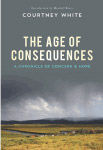Social movements are like ocean waves. They arise at a certain period of time, grow and become an effective agent of change for a while. Some succeed outright in their goals, some regain strength with fresh ideas and make another run at the shore, but many are carried out to sea by the irresistible tide of history. In the American West, the conservation response to natural resource depletion and crisis has followed this latter pattern. Since the late nineteenth-century, there have been four distinct waves of conservation. Each is now in a different stage of the ‘back-to-sea’ cycle, making way for an emerging fifth wave: agrarianism. This wave builds on the strengths and weaknesses of the previous waves as it meets the emerging conditions and challenges of the 21st century.

The Fifth Wave

The Fifth Wave: Agrarianism and the Conservation Response in the American West
“Social movements are like ocean waves…They gather strength, grow and become an effective agent of change for a while. At their height, they either succeed outright in their goals or else begin to fade as circumstances evolve and their effectiveness declines. In the American West, the conservation response to natural resource depletion and crisis has followed this pattern. There have been four distinct waves of conservation—federalism, environmentalism, scientism, and collaboratism. Each is now in a different stage of the “back-to-sea” cycle, making way for an emerging fifth wave—agrarianism.”
Originally published in the Quivira Coalition’s Journal, no. 37, January 2012

Prologue to Age of Consequences
“This book was born on a sunny summer day in 2006 when I stepped out of a movie theater with my wife into the warm embrace of a lazy afternoon. Gen and I had finally found a convenient time to see former vice-president Al Gore’s inconvenient documentary on global warming with its dire warnings of environmental and social turmoil ahead if we maintained the Status Quo. Like millions of others, we were unnerved by what we saw. I was especially disturbed by the graphic images of rising sea water snaking through the streets of Manhattan, Shanghai and other low-lying cities around the globe. As we stepped off the curb into the parking lot, blinking in the bright sunlight after the movie, I quipped to Gen “We’d better see Venice, quick.””
Originally published by Counterpoint Press, January 2015
http://counterpointpress.com/products/the-age-of-consequences/

Four Farms…Down Under
“I had the pleasure recently of spending twelve days in Australia, visiting four amazing farms, giving a talk to a carbon farming conference, and having my brain saturated with a cavalcade of innovation. I also drank a boatload of instant coffee. I was impressed by Aussie inventiveness, by their open, upbeat, and nonconformist ways, and by their willingness to tackle topics that Americans shy away from…”
Originally published in the Farming Magazine, Winter 2011

Walking the Talk
“Talk of ecosystem services is all the rage today among academics, activists, agencies, and policy-makers. But for ranchers Tom and Mimi Sidwell, who produce grassfed beef in the high, dry plains of eastern New Mexico this talk is old news. That’s because they have been delivering ecosystem services for decades – they just didn’t know it had an official name until recently.”
Originally published in Acres (cover story), vol. 41, December 2011

Conservation in the Age of Consequences
An essay on how conservation might meet the challenges of the 21st century.
Originally published in the Natural Resources Journal (Vol. 48, No.1), published by the University of New Mexio School of Law, Winter 2008.

On Normality
A rumination on our chaotic world and the ‘little normals’ that make life worthwhile.
Originally published in The Quivira Coalition Journal No. 33, October 2008

$7 Gas and the New West
What would happen to the West if the price of gasoline hit $7 a gallon? It may not be as far-fetched as it sounds.
Originally published in The Quivira Coalition Journal No. 32, April 2008



